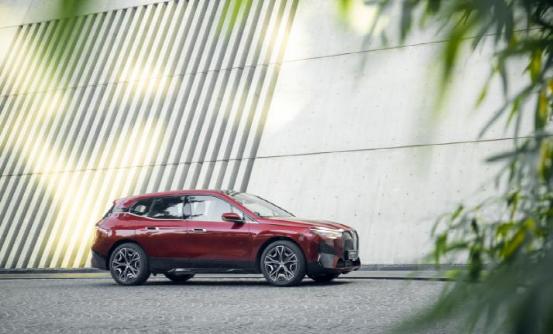Sustainability is the philosophy of the "BMW i" brand, and the BMW iX is a "greenest electric vehicle" built with a highly sustainable strategy.
Discarded plastic bottles, old clothes not worn, worn-out running shoes, broken fishing nets... What kind of magical experience is it that these "useless things" that seem to be directly into the garbage dump, under the blessing of "green magic", are transformed into important components on a luxury electric car?
On bmw group technology flagship BMW iX, you can see it.

Inside the car, the thick and soft touch of the sole pads is more direct than the wrapping of the seats. In contrast to traditional fabric carpets, bmw iX floor mats are made of ECONYL 100% recycled nylon from Italian nylon yarn producer Aquafil.
ECONYL is a nylon yarn that can be infinitely recycled and regenerated, made from 100% waste extracted from landfills and the ocean, with the same properties as new nylon. Pre-consumer textile waste and industrial plastics, as well as post-consumer waste, such as used carpets and fishing nets, ultimately make up this material.
It took Aquafil 4 years to develop this new material that can be recycled indefinitely, it is LEED certified (leading energy and environmental certification), and it is currently the only fiber in the world that is spun entirely from recycled plastics. For every 10,000 tons of ECONYL produced, 70,000 barrels of crude oil can be saved and 65,100 tons of CARBON dioxide emission equivalent avoided, which has a positive impact on the environment.
The BMW Group has been a loyal customer of ECONYL materials since 2016, and the carpets, roofs and floor mats of BMW i3, the opening of the BMW i brand, are made of ECONYL materials.
This concept of "unlimited recycling" is highly in line with the BMW Group, which has written the "greenest electric vehicle" into its strategic system, and the BMW Group wants to reduce the carbon footprint of the car throughout its life cycle: from raw material extraction to production and use to end-of-life recycling.
In total, each BMW iX utilizes around 60 kg of recycled plastic, and in addition to the floor mats, the fabric/microfiber interior is made of 50% recycled polyester. It is a lightweight, fast-drying and highly recyclable material.
Shifting the gaze from the floor mat to the centre console, which is covered with a large area of soft leather, a delicately sized and cute olive leaf pattern is clearly engraved on the left side of the air outlet of the co-pilot air conditioner.
This is an environmental protection "Easter egg" left by the designers, and behind it is BMW's affectionate confession of "pro-nature concept".
This bouquet of olive leaves means that the leather upholstery used in the BMW iX car is tanned from natural olive leaf extracts that prune olive trees, minimizing harmful residues during the manufacturing process. Leather tanned with olive leaf extract is soft to the touch and has a fresh smell.
The leather in the BMW iX interior is produced from Natural Fiber Welding (NFW), a sustainable materials technology company. In July, BMW i Ventures, a venture capital firm owned by the BMW Group, injected NFW into the NFW. American fashion luxury brand Ralph Lauren and San Francisco-based innovative footwear brand All birds have both made venture capital investments in NFW.
Planks on the suspended island platform of the BMW iX Central Passage, raw materials derived from certified wood from the Forest Stewardship Council. The Forest Stewardship Council is an independent, non-profit non-governmental organization founded in 1993 that provides certification of forest products and protects the human and wildlife that depends on forests.
There are many "green factors" that consumers can see and touch on BMW iX, but there are many more far-reaching sustainability measures, and the "behind-the-scenes heroes" that most people do not know.
BMW's Plant in Germany, which produces the BMW iX, uses 100% of its local green hydropower to power new car production. To this end, the BMW Group has signed long-term contracts with Stadtwerke München and RWE Supply & Trading, where the green electricity needed for the production of the BMW iX will come from the Uppenborn river hydroelectric power station in Isar.
The Dingefin plant is also optimized for packaging planning and transport logistics. The plant can achieve a recovery rate of more than 90%, and the plant's own wells can meet more than 40% of the water demand. Since 2006, the BMW Group has reduced its overall water consumption by more than 30 percent.
According to independent auditors, the BMW iX xDrive40 emits about 45 percent less greenhouse gas emissions than comparable vehicles with internal combustion engines.
The sustainability mindset that runs through the entire value chain together shapes the fact that 95% of BMW iX vehicles are recyclable, which is not only the digital champion of the complete vehicle recyclability rate in the automotive industry, but also a solemn commitment of the times made by BMW to protect the world's environment.
By 2030, the BMW Group plans to reduce CO2 emissions by at least 40% over the entire life cycle of its vehicles from 2019 levels, reduce CO2 emissions per vehicle in its supply chain by 20% and produce 80% less CO2 from production. Co2 emissions per vehicle and per kilometer traveled are at least 50%.
As Chiptze, chairman of the BMW Group, said: "The best cars should be sustainable, because the concept of sustainability is inseparable from the connotation of high-end luxury." BMW puts sustainability at the heart of everything it says and does, which is an important cornerstone for successfully shaping the future, and a successful business model is inseparable from sustainable development. ”